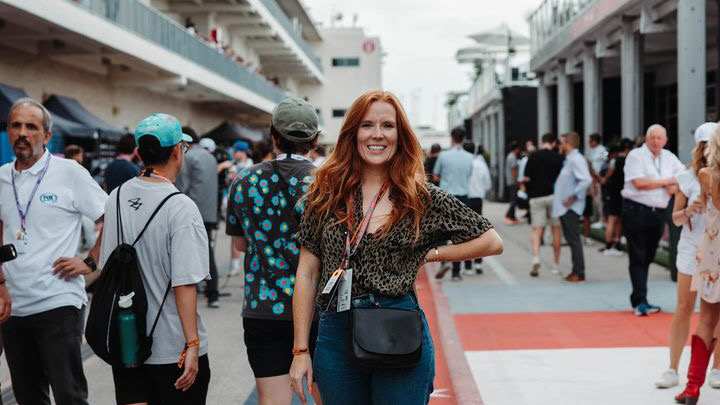EXCLUSIVE: Toni Cowan-Brown On Challenging Norms In F1, Social Media's Influence, And The F1 Academy

In the first part of our interview with Toni Cowan-Brown, we delved into her impactful work in Formula 1, highlighting her role as a co-host on Red Bulletin's podcast 'Ready For The Big Time: F1' and her advocacy for women in motorsport through her social media platform and business, Sunday Fangirls. The conversation not only offered insights into her personal journey and the genesis of her projects but also touched upon broader themes of inclusivity and change within the F1 community. As we progress into the second part, we explore deeper aspects of these themes, particularly focusing on the intersection of gender, culture, and the evolving nature of social media in motorsport.
Read part one of our conversation here.

Lydia Mee: What were your thoughts on Danica Patrick’s comments about F1 being a “masculine” sport and that there isn’t a need for an all-female racing series?
Toni-Cowan Brown: “The second podcast episode of podcast talks about this in more depth. I'm at the point with someone like Danica Patrick where I just have no more words. I don't agree with the way she approaches the world and not just within F1, she has said problematic things about the world in general.
“She's entitled to her opinion and I have deep sympathy towards her as she was very often the only woman and so she got, I think, indoctrinated and that's maybe the wrong word, but in that, ‘You've done it, you're so lucky. You're the only woman that made it. There's something special about you and there's something wrong with all the other women that made it.’
“No, it's a societal problem that there was only room for one woman. I've lived that in the corporate world. I remember being young and being told all the other women just couldn't crack it in corporate. That’s not true, you had room for just one and then you pitted us against each other. And so I can understand how that will frame a narrative or a way you approach something.
“The way I've looked at things like the W Series and F1 Academy is that the W series failed on a bunch of accounts, but, it was the genesis of starting to think about this. I was talking with Susie Wolff and Stephanie Travers in Austin, and I think they agreed with this, but I was saying the way I look at the F1 Academy is something that we need right now and hopefully we won't need in 5 or 10 years time. It's a thing that we need right now to sort of re-level the playing field to realise that, for so long, we ignored women.
“I can only imagine the hell that Danica went through. Does that excuse the way she approaches the topics in the world today? No. But I think it gives us an inlay of what she's experienced and I saw this a lot in the corporate world with a lot of the women that I worked with who were in their mid 50s or 60s, and you heard the stories and you understood why they were just like, ‘I'm not going to do anything for the women, they just need to figure it out on their own’. They’re still projecting everything that they went through, which was most likely very wrong. So I can only imagine what Danica has gone through and experienced but, it was the wrong time, wrong place, wrong delivery, for sure.”
LM: What are your thoughts on the F1 Academy racing in some countries next year that have questionable beliefs around women?
TCB: “I could have a very Western approach, which is that it's bad, they shouldn't do it, they don't respect women. Then at the same time, let's not be hypocritical here, we also race in Texas and Florida who have abysmal track records of women's rights, abortion rights, and the LGBTQ+ community rights. It’s such a western approach to think that way. I'm not comparing the two because I don't think I have the capacity to compare the two because I've been many times to Florida and Texas, and I live in America right now. I was born and brought up in Europe and I've never lived in any of the Gulf States or regions so I come at it with that lens.
“I used to be very much like we just shouldn't engage and shouldn't go there. But I think that's where it gets dangerous, we have young women in the F1 Academy who come from the Gulf regions who are incredible, and will openly talk about the racism that they have faced. They are amongst people who just don't understand their culture and who make a lot of assumptions, and I think that's where I get very nervous. So we can't just ignore these parts of the world when they have drivers competing. And at the same time, we have to be able to differentiate the citizens and the culture with the actual governance.
“It's a really hard one. I don't think the answer is no, we can't go and compete there. I do think it's okay, if we're going there, what does it mean to race there in the right way and what I mean by that is we will respect the culture and the understanding of the country in which we are going to race but also they need to respect the women who are coming in and the different sexualities and the way they project themselves. I think that is going to take a long time and a lot of conversations and I don't think we can achieve that by just boycotting it.
“I have such a hard time with this because at its core I think it is a very easy debate to have but at the same time, every time I say that, there are so many more layers that go into it. We throw around ‘let’s keep politics out of sport’. First of all, I laugh because politics has always been so intertwined with sport right from the get go but also, most of the time, this is not actually politics, it’s human rights. I think the bigger question is, ‘let’s look at these countries and why they are pouring in so much money?’, and, ‘why are we racing there instead of countries where we feel more comfortable?’ Then let’s have a conversation about why we feel more or less comfortable and what does that actually mean?
“I think the main thing to look out for is, did the women feel safe? Do they want to go back? Did they feel respected? That is the only thing at the end of the day, I think, that matters. But it’s very difficult to have that conversation if we don’t go there in the first place.”

LM: Do you see the likes of F3 and F2 changing in the future to cater more for both men and women? For example, bringing in power steering which is currently a big issue, and how do you feel they should be changed?
TCB: “Tatiana Calderón talks about this in such incredible detail and with such passion of just like how am I expected to drive a car that wasn't built for me with me in mind? My body just doesn't fit the car, the steering wheel is not made for smaller female hands and you always get people that come back and say well Yuki [Tsunoda] fits in the F1 cars. Then you're saying that the only difference between men and women is women are just shorter, which is fundamentally wrong.
“We have smaller torsos than men which means that if you build a car with an average male torso, the women are always going to be sat lopsided. So I think Formula 2 for the first time this year/next year will be building cars with average bodies in mind, not average male bodies. We're talking 2023 here, which is mental.”
LM: What do you feel still needs to change in the sport to make it more inclusive?
TCB: “I feel like it comes down to the fact that they have to loosen the very archaic and strict rules that they used to have. Such as on teams and drivers, certain drivers cannot be seen supporting another team in the F1 Academy. I’m making assumptions here, but it always seems to come down to some very strict rules. For example, it seems that one of the reasons that we didn’t have the F1 Academy streamed/broadcast live this year was down to who has the rights and down to these very restrictive rules that I think that F1 and the FIA need to shake off a little bit. I think that is the biggest gift that F1 could do, is to just treat this with a clean slate and don’t use your archaic rules to figure out this brand new space and series because it is not going to help. I think the best thing they achieved in Austin was having the two side by side, having that access, I saw a bunch of people leave the F1 paddock and land in the F1 Academy, where I was like, ‘Great, now that you’re here, take a tour! Spend some time here.’"
LM: How have you seen Formula One change with the massive influence of social media, and how do you see it evolving further in the future?
TCB: “I think they don’t have a choice, they have to. I think F1 is desperate to control the narrative but in this day and age, there is no controlling the narrative, it’s going to control you in one way, shape or form. You can’t control it. But, the thing I find maybe most interesting is that it has been fascinating to watch F1 and F1 teams mimic what young women have been doing on the internet and getting praised for it when those same women were absolutely humiliated and vilified for it.
“I think of something as simple as the thirst traps, I had to do a double take at least three times this year that I was on the official Ferrari page because I was like, ‘What is happening?!’ It’s a slow-mo video of Charles Leclerc getting in and out of his ice bucket. They know exactly who they are tailoring this to. But also, the women who first started this content trend and realised this is what people wanted were vilified and they got so much hate. You can’t just take and copy and mimic and then not protect those people you are taking the ideas from who are getting so much s**t for it on the internet.
“The best teams are the ones that are going to realise that social media is a place where a lot of hate can happen and yes, you can get very creative and you can get a lot of inspiration, it would be great if you could shout out who you are getting inspiration from but maybe that’s pushing it a bit too far, but you also need to make sure you are safeguarding and looking after the people that are giving that much time to you on social media.”
